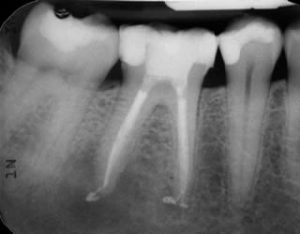Root Canal Treatment? How To Avoid It
There is much that you can do to help avoid the need for a root canal procedure
 We would like to take this opportunity to wish all of our Wickford patients a happy New Year as we come to writing our first blog of 2023. For some, the topic of this blog might be a little unnerving and we are aware of the fear that the words ‘root canal’ can bring to some of our more nervous patients (and some not so nervous).
We would like to take this opportunity to wish all of our Wickford patients a happy New Year as we come to writing our first blog of 2023. For some, the topic of this blog might be a little unnerving and we are aware of the fear that the words ‘root canal’ can bring to some of our more nervous patients (and some not so nervous).
We will come to that later when we look at the actual root canal procedure. Initially though, we want to look at things that you can do yourself to reduce the risk that you will ever need to have this done.
Most of the suggestions below are common sense, or they should be, but it is always worth reminding patients as some may have slipped into bad habits over the years and a remainder is always useful. It is worth remembering that the root canals are located inside the tooth which means that there is already a good degree of protection. The key is to make sure that this defence stays strong and healthy.
Good oral health care regime
This is the most important thing that you can do to protect the root canals of your teeth. Before an infection can reach that area, it first has to pass through the hard external enamel layer and then the softer dentin layer beneath it. Let us first focus on the enamel. This is the most protective part of a tooth and is hard wearing. It can suffer damage though both from accidents but also tooth decay. It is essential then to make sure that you brush your teeth well twice a day and also use floss to clean the areas between the teeth. You should also see the hygienist at the Cygnet Dental Practice to give your teeth (and gums) the best chance of staying healthy and strong.
You should also make sure that your toothpaste contains fluoride as this will help to strengthen the enamel. Most commercial toothpastes will do but some ‘natural’ ones may omit this important tooth saving ingredient. Make sure to check before you buy.
Restore any damaged teeth
Although we may do all that we can to look after our teeth, sometimes small amounts of decay occur or we may chip or crack a tooth. If the cavity is not causing us any discomfort and/or the crack/chip appears to be very small, we may be tempted not to have it checked out until our next check up appointment which might be some time away. This is a bad mistake and it is important that you have any damage or decay checked straight away at our Wickford dental clinic. Small areas of tooth decay will almost certainly be restored with a filling and there are various ways that a chipped or cracked tooth can be treated if necessary. By seeing the dentist promptly, you will improve the chances of bacteria failing to enter the tooth and potentially reaching the root canals.
When it’s too late
Not all advice is always followed unfortunately, and some patients might find that their root canals become infected and often very painfully as this is where the nerves of the tooth are located. There are only two options available when this happens; extraction or a root canal procedure. The fear factor of a root canal procedure has even led to some patients requesting the tooth be extracted instead. There really is no need for this though and although root canal treatments were once very painful indeed, things have changed significantly for the better.
It is likely that it got its reputation from days gone by when anaesthetics were not as effective and x-rays not taken prior to the treatment. In some cases this would have resulted in an undetected abscess being present. We don’t need to go into detail about how painful that would be if a dental implement came into contact with it!
These days, x-rays are routinely taken to check for abscesses and if any are found, the treatment will be postponed until the abscess has been treated. Once this has happened, the treatment can start.
You will be given a local anaesthetic. These are now very powerful and although you might experience some sensations such as vibrations from the drill, you shouldn’t experience any significant discomfort. Once the area has been numbed, the dentist will remove the top section of the tooth and remove the infected pulp from the root canals before cleaning them thoroughly. The hollow canals will then be filled with a special filling called Gutta Percha and, in most cases, a crown will be added to complete the tooth leaving it looking more natural and providing extra strength.
It is true that a root canal treated tooth may not be as strong as a healthy tooth but it should provide sufficient strength for everyday use. Your dentist will advise any precautions that you need to take with it.
As you can see, the procedure really is nothing to be feared and is certainly a better option that having the tooth extracted.
With the new year just a few days old, this might be a good time to make sure that you are looking after your teeth as you should. Make sure too that you have appointments booked to see the dentist and dental hygienist every six months and if you haven’t, or if you need an appointment to have an issue checked out, please call the Cygnet Dental Practice today on 01268 733078.
